Opinion
A Cabinet reshuffle needed
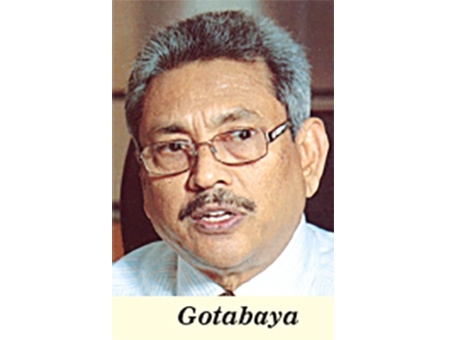
By Dr Upul Wijayawardhana
It looks as if the government did not realise the need to take drastic action to stem the tide of public disapproval. Even the most optimistic, who were overjoyed at the election of a non-politician President, followed by that of a government with an unexpected thumping majority, are sighing in despair! Although part of it is due to avoidable own-goals, there seems to be an extremely effective anti-government campaign directed by an unseen hand. Even when toxins are detected in imported coconut oil, rather than laying the blame on errant importers, attempts are made to tarnish the image of the government. All this is possible because the government seems to lack an effective communication strategy. One wonders whether the government has a lax attitude because the Opposition is blundering.
The fracas in the Parliament on the issue of Ranjan Ramanayaka losing his seat was the best illustration of a misguided Opposition not fit for purpose. Critics may argue that RR was given an unfairly harsh punishment but their criticism lacks moral authority because they opted to be silent when a Buddhist priest was given a much harsher punishment for the same offence: in fact, they were delighted! RR stated publicly that most judges were corrupt and defended his stance at every possible turn. He also refused all opportunities afforded for clarification. In spite of the Attorney General informing a while ago that RR’s seat should be declared vacant, to his credit the Speaker waited till RR’s petition for appeal was dealt with. Even though the facts were obvious, the Leader of the Opposition accused the Speaker of removing RR on the basis of non-attendance for three months, which he had to correct the following day! Those who blamed the SLPP for staging unruly protests in Parliament in October 2018, did the same on behalf of RR. Is this not laughable?
Once and for all, the question of the authority of the President was settled with the passage of the 20th Amendment and it is high time the President made use of his new powers. The most important thing he can and should do is a cabinet reshuffle, a mechanism often adopted by British Prime Ministers by way of a course correction. It need not be a major reshuffle but a minor one involving some ministers who are obviously underperforming. I have written in the past about the Minister of Health who demonstrated gross irresponsibility by partaking of an untested and unlicensed medicinal product. She is also responsible for not implementing the Jennifer Perera committee report on the disposal of bodies of unfortunate victims of Covid-19? Had this been implemented in December, much of the adverse publicity the country received could have been avoided. Perhaps, the voting during the UNHRC resolution also may have been very different. The Minister of Public Security talking of banning some face coverings did not help either. Pity he did not realize he was talking of this at the wrong time; during an epidemic when face coverings may be useful.
The Minister of Trade, who was an effective critic in the Opposition, has turned out to be totally ineffective. Even the government gazette has become a joke due to his actions. Perhaps, it is time for him to take a back-seat and allow someone else to have a go at the rice-mafia. etc. Perhaps, ex-president Sirisena may be given a chance to see whether brotherly love is more effective than the gazette in controlling the prices of rice.
The biggest failure of this government is on the diplomatic front. What most diplomats consider to be the most important diplomatic assignment, the post of High Commissioner to India remains unfilled for almost a year. Whether we like it or not, India is fast gaining the status of a world power, and not having our representative to deal with officials acknowledged to be of top calibre is a shame.
The way the UNHRC resolution was handled showed total incompetence of the highest order. We withdrew but the Ambassador decided to take part; we lost and claimed victory! To cap it all, the Foreign Minister announced in Parliament that the resolution was illegal. All the time sinister forces are at work, relentlessly, to undermine the country and force the separatist agenda on us and if we are not sharp, we may end up in disaster. For reasons best known to themselves, the government failed to utilize fully the good offices of Lord Naseby. Statements made by the Foreign Secretary no doubt irked the Indian and US governments.
For all these reasons, the need of the day is a complete overhaul of our Foreign Affairs set up, starting with the Minister. It is high time we made use of our career diplomats, who are well trained for the job and stop sending political ambassadors. The practice of utilizing ambassadorial posts as parking lots for retired service chiefs is abhorrent, as it gives the false impression that Sri Lanka has a military government in all but name.
There is still a chance for reversal of fortunes, if the President decides to act swiftly after returning from Sinhala and Tamil New Year celebrations. If not, unfortunately, there may not be much left to celebrate!
Opinion
Speaker’s Wig : Why split hairs over a piece of horsehair?

By Gomi Senadhira
I was surprised to read a few comments published in the newspapers and social media about the way the Speaker Ashoka Ranwala wore his speaker’s wig at the ceremonial opening of the parliament. Some of which were extremely unwise, for example, one such comment was, “This shows how stupid the entire parliament is. Please teach the Speaker to wear the wig properly. Looks like he just got off from a motorbike. Has he not seen a Speaker before in his life?”
On ceremonial occasions, the Speaker of Sri Lanka’s parliament wears a black robe trimmed with gold lace and a full bottomed wig. This is a practice we have copied from the British House of Commons where the Speaker wore a black and gold robe over court dress with a white waterfall cravat and a full bottomed wig. In addition to the speaker the clerks, who are the senior officials in the House of Commons, also wore bob wigs and long gowns. Fortunately, we did not adopt that dress code for the officials. Unfortunately, the speaker copied this British fashion from the seventeenth century and continues to follow it.
In 1992, the Speaker Betty Boothroyd, the first female speaker of the British House of Commons, ditched the wig because she “…couldn’t have a good laugh disguised in something so imperious.” Since then her successors too have followed her style and have further simplified other aspects of their costume and started to wear plain black gowns over lounge suits. Furthermore, in 2017 the UK parliament’s Speaker John Bercow ruled that wigs and formal dress will no longer be worn by parliamentary officials in the Commons, ending a 300-year-old practice.
However, the current Commons Speaker Lindsay Hoyle, who was elected to the post in 2019, decided to go back to the old tradition and wear his full ceremonial attire for the State Opening of Parliament by the queen. He also had also directed the Clerks of the House of Commons to wear their bob wigs. So, the Clerks have once again started to wear their wigs. But when it came to the Speakers own wig there was a slight hitch. The horsehair ceremonial hair piece which was last worn by Speaker Bernard Weatherill before his retirement in 1992 had gone missing and the House of Commons officers failed to find it even after an extensive search within the Palace of Westminster. A new wig would have cost over one thousand pounds (£1,320 plus VAT to be exact) to British tax payers. So, if one Googles Lindsay Hoyle, it is possible to find a picture of him walking through the Members’ Lobby in the House of Commons during the State Opening of the Parliament by the Queen, wearing the formal Speaker of the House of Commons regalia, a black and gold robe over court dress with a white waterfall cravat…. but no wig!
That means, it has been three decades since the speaker of the UK’s House of Commons last wore this “imperious” piece of horsehair. In our neighbourhood, the Speakers of the India’s Central Legislative Assembly used to wear robes and wigs while presiding over the meetings of the Assembly from 1921 to 1946. But in 1946 Speaker G.V. Mavalankar stopped that practice. In Australia, the traditional outfit of the Speaker of the House of Representatives included a black academic gown, a jacket, a lace collar and a full wig. But the last time an Australian Speaker wore the full ceremonial outfit was in 1983. The Speaker’s wig, I understand it is on a “loan” to a museum, where it really belongs.
So, isn’t this the proper time to stop splitting hairs over how to wear this ceremonial piece of horsehair and ask why the speaker should continue to wear this glaring symbol of colonial inheritance?
(The writer, a retired public servant and a diplomat, can be reached at senadhiragomi@gmail.com)
Opinion
Remembering Senator Ratnayake – a response
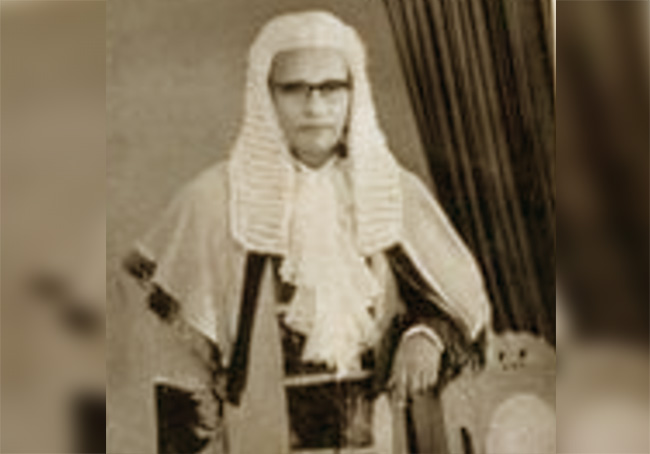
I refer to Maneesha Seneviratne’s excellent tribute to Senator A. Ratnayake in The Island of 25 Nov.
One of the most valuable events in A. Ratnayake’s career stands as a powerful reminder for those who fervently compete for positions in governments and within political parties driven by sheer greed.
This is about how he became the first Cabinet Minister of Food, Co-operatives, under D S Senenayake. Ratnayake had often been a vocal critic of D. S. Senanayake and his policies during their time in both the State Council [in 1936-47] and later in Parliament. He had, on occasion, even supported Marxists like Dr. N. M. Perera and Philip Gunawardene, representatives of Ruwanwella and Avissawella electorates, respectively. Ratnayake believed this history of dissent would make his chances of being offered a ministerial position highly unlikely.
To his surprise, one evening, the phone rang. When he answered, the familiar voice of D. S. Senanayake greeted him with an unexpected question:
“I say, Rat, how would you feel about joining my Cabinet?”
Ratnayake was momentarily stunned into silence. Regaining his composure, he replied in Sinhala with a hint of humour, “Sir, ara ibba waturata danawa wage ne” (It’s like asking a tortoise to willingly enter the water).
Senanayake burst into hearty laughter, momentarily deafening Ratnayake. Once the laughter subsided, Ratnayake inquired about the portfolio being offered. He expressed a preference for the Education Ministry, noting his extensive experience serving on education committees in the State Council and even acting as Minister of Education.
However, Senanayake was firm. “No, Rat. I want you to handle the subjects I managed during my time in the State Council. Will you honour me by accepting the position of Minister of Food and Cooperative Undertakings? The other part, Agriculture, I want Dudley to take over—he has already agreed. You are the only person I trust to carry forward the plans I initiated, even though you’ve been one of my harshest critics.”
This unexpected offer left Ratnayake both surprised and deeply hounored.
After the first Parliamentary election under the Soulbury Constitution in 1947, D. S. Senanayake gave Sir John Kotelawala a practical instruction. “I say, Lionel, check if we have a majority. If not, see if you can get a few chaps to join the government. The Eastern Province members are the best bet—they always come to Parliament with open minds,” he remarked, laced with humour.
Reflecting on his tenure in the first Parliament, Senator A. Ratnayake once said, “After 16 years of giving the government hell, I found myself on the receiving end—and what an unrelenting opposition it was. Among them were NM and Philip, and, of course, Dr. Dahanayake. Taming that opposition was like trying to humanise hell.”
Dr. Dahanayake, in particular, stood out as one of the most vocal critics of Ratnayake’s policies, challenging and dissecting his decisions with vigour. These spirited exchanges underscored the era’s vibrant democratic ethos and the intense parliamentary discourse that shaped policy and governance.
KKS Perera
Opinion
Handle rice issue diplomatically

It is a well-known fact there is a cartel of a few rice millers with regard to the purchase of paddy and sale of rice in the country. The whole blame for this development should rest solely on the previous dispensations. Those past governments created a situation where ample opportunities were made available to a few wealthy persons with close connections to some powerful politicians of the day, for purchasing paddy from the farmers at very low rates and later sell the milled rice to the consumers at exorbitant prices according to their whims and fancies. Those in authority turned a blind eye to this operation as they benefited from the rice millers. They weakened the state mechanism which had been introduced by the previous government for purchasing paddy and converting such stocks into rice and making available that rice to the people at affordable prices through CWE and the co-operative outlets. The previous governments deliberately sabotaged the operation of this mechanism to pave the way for a few politically and otherwise close rice millers to exploit the rice market in the absence of any competition.
The Paddy Marketing Board was neglected by previous governments. Now this rice miller mafia has become a formidable force even the government cannot control. The moment the government steps in to remedy this situation, the rice miller mafia will go all out to thwart the government’s efforts at controlling the price of rice. These rice millers extend loans to the farmers at the commencement of paddy growing seasons and ensure that the latter sell their paddy only to them at the prices they fix. The indebted farmers have no alternative other than selling produce to those millers at very low prices stipulated by them.
Now the PMB has neglected all its paddy stores and mills, and the government has no money to be released to the PMB for purchasing paddy. The vacuum created by non-involvement by the government in the purchase of paddy offered a golden opportunity to the rice millers to purchase paddy at the prices they desire. This is the sorry state of affairs now prevailing in the country.
What would be the scenario if the government stepped in to solve this problem by using its power? It has neither money nor facilities for storing paddy and operational rice mills for milling the paddy. The rice miller mafia could ensure that there will be no rice in the market, at all. They can afford to do so. Therefore, I feel this is a very delicate issue that has to be handled diplomatically.
The government should come to a compromise with the rice millers wherein the millers will be able to dispose of their stocks of rice in the market at a reasonable price in line with the expenses they have incurred in purchasing paddy. The government should be flexible in deciding the price of rice taking into consideration the expenses incurred in acquiring such stocks of paddy by the millers and persuade the millers to release the stocks of rice they now hold to the market at the revised prices. Retaining the current controlled price of rice will aggravate the situation.
K. M. Suraweera
Veyangoda
-
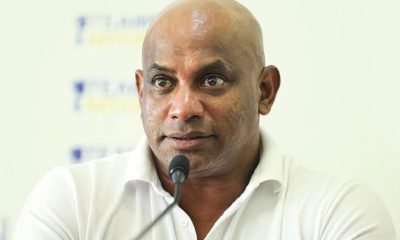
 Sports6 days ago
Sports6 days agoPathum will become world’s best batter, says Jayasuriya
-
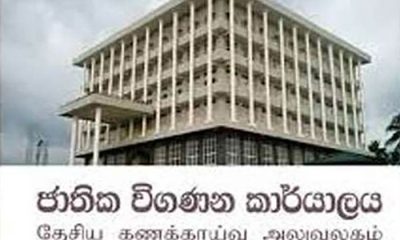
 News5 days ago
News5 days agoAbout 1,000 permits issued to SL migrant workers for electric vehicle imports misused
-

 Sports7 days ago
Sports7 days agoSri Lanka’s cricket revival continues
-
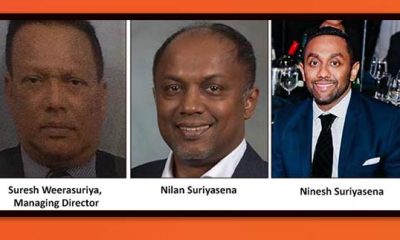
 News6 days ago
News6 days agoGoldi Sands celebrates its 50th anniversary
-

 Sports22 hours ago
Sports22 hours agoA lot at stake in Sri Lanka – South Africa Tests
-

 Editorial6 days ago
Editorial6 days agoSign of capitulation
-

 News5 days ago
News5 days agoTorrential rains play havoc in Jaffna
-

 Features4 days ago
Features4 days agoSri Lankan mannerisms in Ischia, sex in Samoa and Kerala











